Jury finds 'sovereign citizen' guilty of murder; judge sentences her to life in prison
At the end of her closing argument Friday afternoon, Neely Rayne Pesognellie Petrie Blanchard told the jurors in her murder trial to deliberate as long as they wanted. She told them she hopefully will get a chance to tell her side of the story because there's so much she want to tell them, and she'll see them when they make a decision.
That was at 2:54 p.m. Circuit Judge Lisa Herndon read aloud the final pages of the jury instructions and the seven men and five women went to the back to deliberate at 3:02 p.m. At 3:34 p.m., they notified bailiffs that they had made up their minds.
Inside the courtroom, friends and families of Blanchard, and Christopher Hallett, the victim, sat on opposite sides waiting for the word. The clerk read aloud the verdict: guilty of first-degree murder with a firearm in the November 2020 shooting death of Hallett.
Blanchard cried, as did Hallett's supporters. Acting as her own attorney, Blanchard wanted the jury polled. All 12 said she was guilty.
The jury was excused and the judge returned for an impact panel.
Reactions to the verdict
Hallett's ex-wife thanked the judge for her patience, understanding, and for bringing the case to trial. To Assistant State Attorneys Amy Berndt and Toby Hunt, she gave them a big thank you.
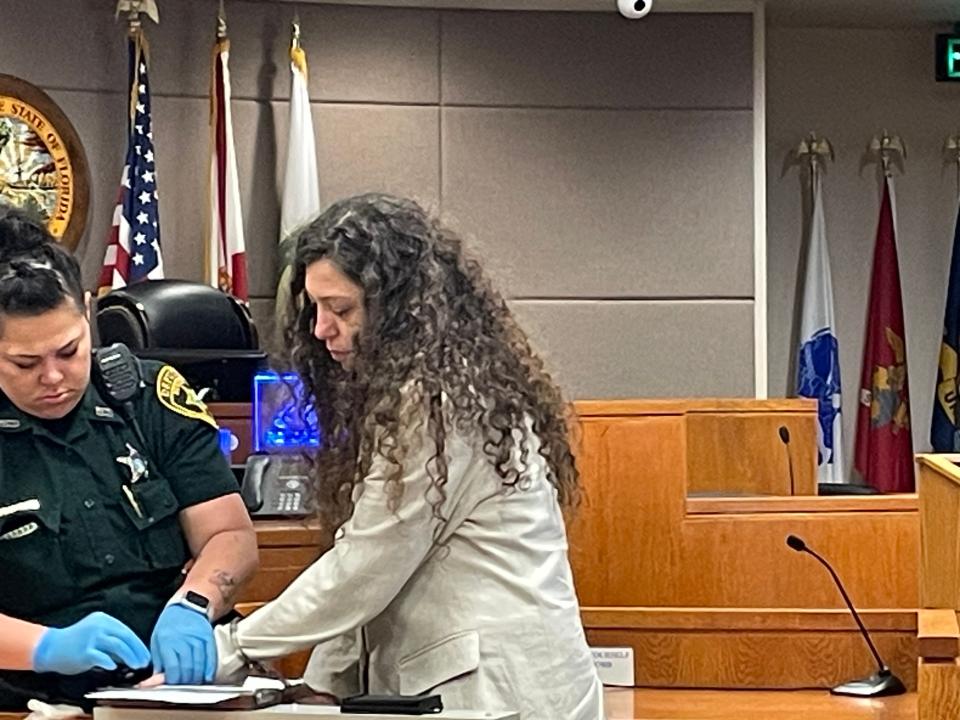
She told Blanchard she has taken away someone who was devoted to his children and grandchildren, to her, and to his significant other. She said his death has been devastating and she hopes they can heal. She told Blanchard she hopes she can remember what Hallett did, and E-Clause.
Hallett's significant other also thanked the judge and the prosecutors. She told Blanchard what she did was the ultimate betrayal and there's no justification for shooting Hallett. She said Blanchard is not insane.
Blanchard's sister and mother declined comment.
Blanchard, a self-described sovereign citizen, was adjudicated guilty of murder and sentenced to life in prison.
State Attorney Bill Gladson told the Star-Banner: "I want to thank the jurors for their diligence during the trial. Being called upon to serve as a jurors is one of the highest forms of community service. I also want to thank the prosecutors who worked tirelessly to seek justice on behalf of the victim and on behalf of the people of the great state of Florida."
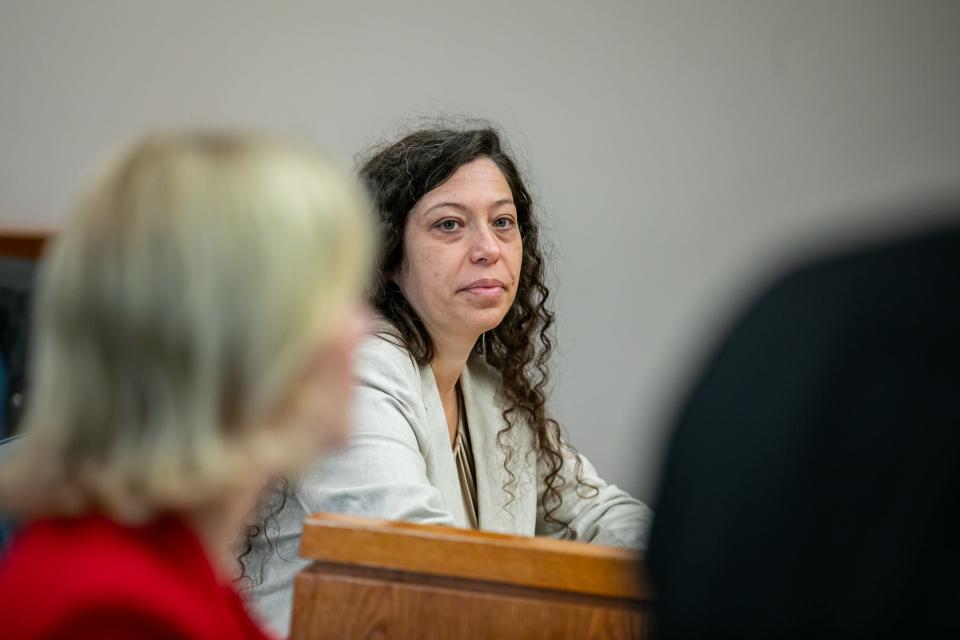
Handcuffed and fingerprinted, Blanchard was led to the back by bailiffs. From there, she was taken to the county jail. It's unknown when she will be sent to prison.
The shooting
Following the shooting, Blanchard drove on Interstate 75 and met her husband. The two then traveled to Georgia.
Sheriff's deputies were called to the incident location. There, a woman and a teenage girl, who's now 20, were found unharmed. They were inside the Marion Oaks home during the shooting. The younger woman testified at trial that she saw Blanchard shooting Hallett.
Through their investigation, deputies were able to pinpoint Blanchard's location and contacted authorities in Georgia, who apprehended the couple. Blanchard was returned to Marion County and has been locked up at the jail since 2020.
Officials believe the shooting was due to Hallett being unable to get back Blanchard's children, who had been removed by state officials. Hallett created E-Clause, whose goal is to reunite parents with children taken away by the state. Hallett created the company because his own children were taken by state officials.
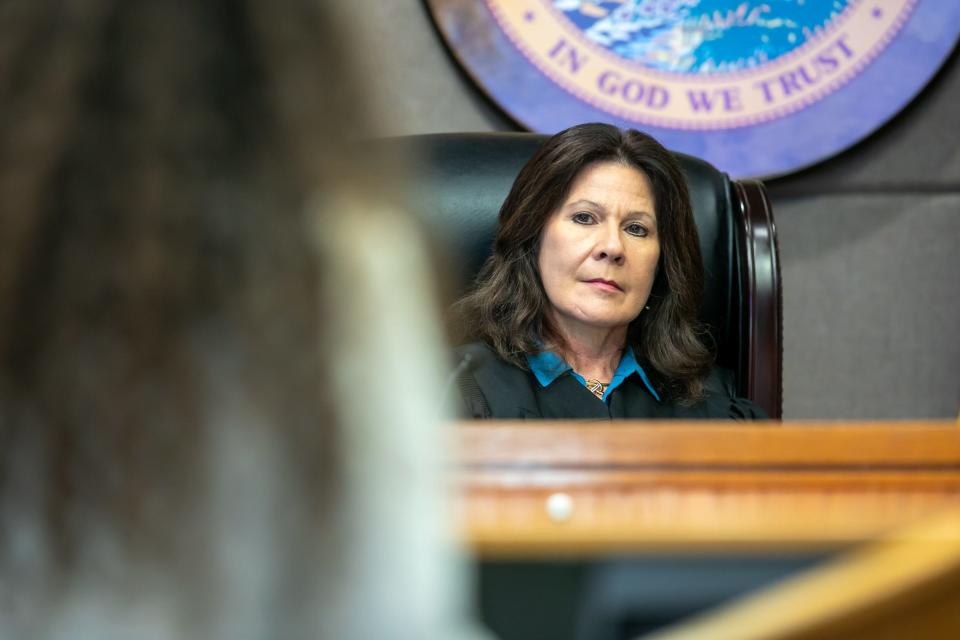
Blanchard had been working with Hallett from 2017 to 2020, but she felt Hallett was not adequately helping her. Blanchard stayed at Hallett's residence the night before the shooting, officials said.
The trial drew many to the courtroom. In total, 22 people testified and 35 pieces of evidence were introduced. The trial began with jury selection on Monday.
Prosecutor Berndt, in her closing argument, said Blanchard wanted to get what she wanted, when she wanted, and she would stop at nothing to achieve her objectives. Berndt said when Blanchard's eldest daughter was taken from her, she took the child from school. When her twins were also removed from her custody, she took them from her mother's care.
Thinking Hallett wasn't making sufficient headway in her quest to regain custody of her children, Berndt said, Blanchard decided to take matters into her own hands and repeatedly shot Hallett.
The prosecutor said Blanchard admitted to shooting Hallett and her action was premediated. She pointed to several facts to support this theory.
First, she said Blanchard told her sister and her mother that Hallett was a liar, and had lied about sending her children to her mother's residence.
Second, the lawyer said, Blanchard brought her husband's gun to Hallett's residence and hid it in the sofa the day before the shooting.
When she was staying at a hotel in Ocala, Blanchard was seen on camera acting normal. When Blanchard was shooting Hallett, the gun jammed. Berndt said Blanchard cleared the jam and fired several more shots into Hallett's body at close range.
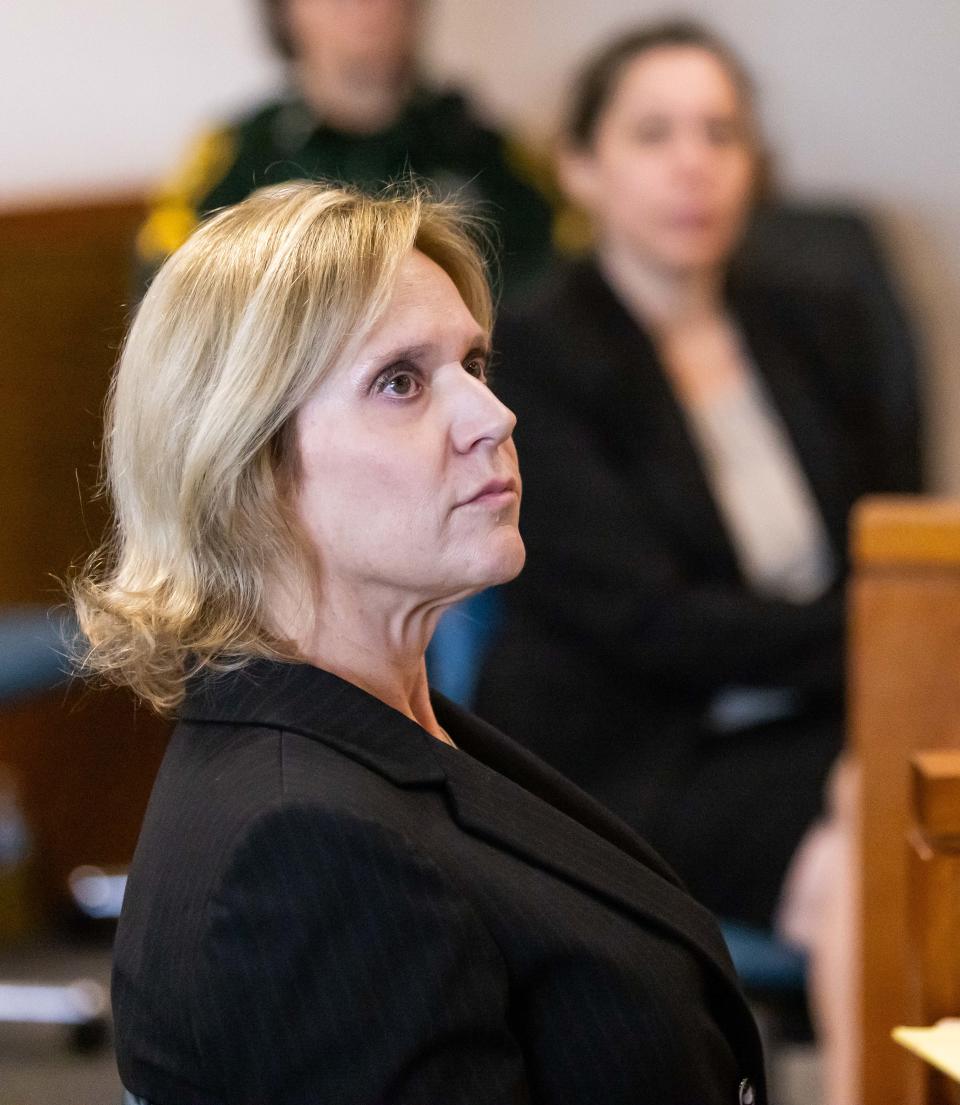
A doctor from the Medical Examiner's Office said Hallett was shot seven times. On the witness stand, Blanchard said she shot Hallett five times.
"She had it in her mind to kill him," Berndt said.
Berndt played a recording where Blanchard is heard saying "I prayed about it. I thought about it before I did it. I did not just do it."
About Blanchard's temporary insanity defense, Berndt said the woman "wasn't disillusioned and she knew right from wrong." She said Blanchard's medical record from the Georgia jail doesn't show any mental disorder nor include any mention of her asking for help.
The prosecutor said the recording made by Kathy Watson that was played in court about Blanchard shooting Hallett proved Blanchard wasn't insane. Watson testified for the defense.
Berndt said the phone calls Blanchard made to her mother and Watson about shooting Hallett were an example of her normal behavior. That's why none of them called 911.
"That's how she acts," Berndt said.
Berndt said Blanchard did the same thing a decade ago during her custody dispute. She doesn't follow the rules.
Blanchard's closing argument
When it was Blanchard's turn, she told jurors she stood before them as a mother, sister and daughter. She said the state had not proved its case. At the time of the killing, she said, she had a brief psychotic break.
Blanchard said people like her, who hold sovereign beliefs and don't accept government authority, are not treated fairly. She told jurors her life was in their hands.
From there, Blanchard began wandering off topic and had to be told multiple times by the judge and Berndt to stick to the case.
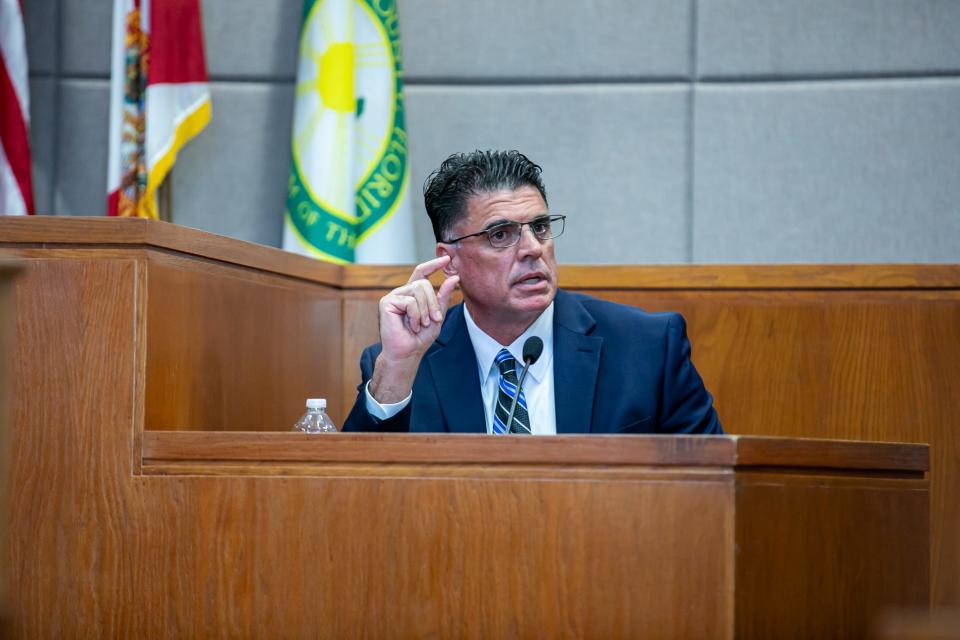
After Blanchard repeatedly ignored the judge's order, the judge stopped Blanchard's closing argument and sent the jurors out of the courtroom. The judge warned Blanchard if she cannot stick to the rules, then she would not allow her to continue with her closing.
Blanchard asked for a break and was given one so she could think about what she wanted to do.
Returning, she told the judge: "I don't know what the rules are. I'm not an attorney."
Fumbling through her stacks of documents, Blanchard said she was ready to continue. The jury came back to the courtroom but Blanchard's closing didn't change. She repeatedly talked about nonrelated issues such as Donald Trump, the government and various conspiracy theories.
The judge rejected them all. A few statements were allowed to stand, including this one: "Chris is smiling wherever he is, saying that's my girl."
Judge says no
Shortly before court resumed Friday morning, Blanchard had filed a motion to delay the proceedings so she could have an attorney. The judge, as in prior rulings, denied the motion, telling Blanchard she believes it's a stall tactic. The judge said Blanchard chose to represent herself, the trial had reached closing arguments, and it was too late to ask for a lawyer.
The defendant concluded her case on Friday morning. The state called a rebuttal witness, Dr. Jason Demery, who had testified earlier in the trial during a competency hearing.
A psychologist and neuropsychologist, Demery told the court he has worked for both the state and the defense in past cases and submitted testimony in death penalty and insanity cases.
He said he has evaluated Blanchard for 2 1/2-hours and reviewed numerous records detailing the defendant's history. Those records include her child custody documents, jail calls, text messages before and after the shooting and medical records.
From his observation, the doctor said there was no diagnosis of Blanchard having a mental disease or defect, such as bipolar or schizophrenia. He explained in order to be considered legally insane, one would have to have the mental disease or defect and, because of that, be unable to know what they were doing or whether it was wrong.
Reviewing her files and talking with her, Demery said Blanchard exhibits intelligence, focus and a strong will. She also is narcissistic, paranoid, grandiose and believes the system is against her.
He concluded Blanchard knew what she was doing when she shot and killed the victim. He said she had the presence of mind to clear the firearm when the gun jammed while she was shooting Hallett.
Trial starts: Trial for self-described 'sovereign citizen' charged with 2020 murder set to begin in Ocala
When Demery was cross-examined by Blanchard, most of her questions were not relevant to the case. When she did ask questions pertaining to the case, she quickly went off topic and either the prosecutor or the judge had to tell her to stay on task.
Contact Austin L. Miller at austin.miller@starbanner.com
This article originally appeared on Ocala Star-Banner: Judge sentences self-described sovereign citizen to life in prison for murder

